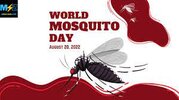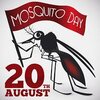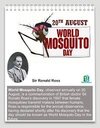Every year, World Mosquito Day is observed on 20 August.
This day is marked to honour and acknowledge the British doctor Sir Ronald Ross.
Sir Ronald Ross was the one who found out that female mosquitoes are responsible for causing malaria in the year 1897.
World Mosquito Day celebrations are organised every year by the London School of Hygiene & Tropical Medicine.
When it comes to mosquito-borne diseases, malaria has the greatest global impact. According to the World Health Organization (WHO), malaria alone is responsible for the death of 400,000 people per year. Other mosquito-borne diseases, even if not fatal, can have devastating consequences for patients. Chikungunya, for example, causes crippling joint pain, and Zika infection in pregnant women can result in severe birth defects.

Why is World Mosquito Day celebrated?
Mosquitoes are one of the most lethal insects in the world. They cause millions of deaths every year. So, to raise awareness about the cause and prevention of diseases caused by mosquitos, this day is marked.
Aedes, Anopheles, and Culex mosquitoes act as vectors, and lead to the spread of many diseases according to the National Health Portal of India.
The mosquito has its own complicated life cycle. Though different mosquito species prefer different locations for egg laying, many Anopheles mosquitoes lay their eggs in undisturbed pools of water. The eggs hatch into aquatic larvae, which grow until the time comes for them to pupate into flying adults.
Adult male and female Anopheles feed on nectar. Females also feed on blood (resulting in mosquito bites) because the nutrients in the blood allow the females to produce eggs.
Prevention of mosquito related diseases:
If mosquito breeding is detected, steps must be taken to eliminate it by covering all water containers, emptying and drying water tanks, coolers, birdbaths, pet water bowls, and drip trays at least once a week.
Long-sleeved clothing and insect repellents can also be beneficial. Physical barriers, such as window and door screens, can be erected. Nets are another method of avoiding mosquito bites.
Some species of larvivorous fishes can also be kept in nearby ponds or ornamental water tanks. It can also enormously reduce the number of mosquitoes.
This day is marked to honour and acknowledge the British doctor Sir Ronald Ross.
Sir Ronald Ross was the one who found out that female mosquitoes are responsible for causing malaria in the year 1897.
World Mosquito Day celebrations are organised every year by the London School of Hygiene & Tropical Medicine.
When it comes to mosquito-borne diseases, malaria has the greatest global impact. According to the World Health Organization (WHO), malaria alone is responsible for the death of 400,000 people per year. Other mosquito-borne diseases, even if not fatal, can have devastating consequences for patients. Chikungunya, for example, causes crippling joint pain, and Zika infection in pregnant women can result in severe birth defects.

Why is World Mosquito Day celebrated?
Mosquitoes are one of the most lethal insects in the world. They cause millions of deaths every year. So, to raise awareness about the cause and prevention of diseases caused by mosquitos, this day is marked.
Aedes, Anopheles, and Culex mosquitoes act as vectors, and lead to the spread of many diseases according to the National Health Portal of India.
The mosquito has its own complicated life cycle. Though different mosquito species prefer different locations for egg laying, many Anopheles mosquitoes lay their eggs in undisturbed pools of water. The eggs hatch into aquatic larvae, which grow until the time comes for them to pupate into flying adults.
Adult male and female Anopheles feed on nectar. Females also feed on blood (resulting in mosquito bites) because the nutrients in the blood allow the females to produce eggs.
Prevention of mosquito related diseases:
If mosquito breeding is detected, steps must be taken to eliminate it by covering all water containers, emptying and drying water tanks, coolers, birdbaths, pet water bowls, and drip trays at least once a week.
Long-sleeved clothing and insect repellents can also be beneficial. Physical barriers, such as window and door screens, can be erected. Nets are another method of avoiding mosquito bites.
Some species of larvivorous fishes can also be kept in nearby ponds or ornamental water tanks. It can also enormously reduce the number of mosquitoes.

 by far more common than malaria & hav no cure!
by far more common than malaria & hav no cure!


